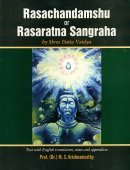Sevana, Sevanā: 21 definitions
Introduction:
Sevana means something in Buddhism, Pali, Hinduism, Sanskrit, Jainism, Prakrit, Marathi, Hindi. If you want to know the exact meaning, history, etymology or English translation of this term then check out the descriptions on this page. Add your comment or reference to a book if you want to contribute to this summary article.
Sevana has 21 English definitions available.
Alternative spellings of this word include Sevan.
Languages of India and abroad
Sanskrit dictionary
[Deutsch Wörterbuch]
Source: Cologne Digital Sanskrit Dictionaries: Böhtlingk and Roth Grosses Petersburger WörterbuchSevana (सेवन):—1. (von sīv)
1) n. = sīvana das Nähen [Vopadeva’s Grammatik 26, 172.] [Amarakoṣa 3, 3, 5.] [Trikāṇḍaśeṣa 3, 3, 271.] [Hemacandra’s Abhidhānacintāmaṇi 912.] [Anekārthasaṃgraha 3, 437.] [Medinīkoṣa Nalopākhyāna 157] (an den zwei letzten Stellen zu lesen sīvanopāstyoḥ). [Suśruta 1, 26, 18.] [Vopadeva’s Grammatik] in [DHĀTUP. 14, 12.] —
2) f. ī a) Nähnadel [Hemacandra’s Abhidhānacintāmaṇi 911.] — b) Nath, Verbindungsstelle am menschlichen Leibe (fünf am Kopf, je eine an Zunge und penis oder Hodensack) [Bhāvaprakāśa] in [Oxforder Handschriften 311,a,2 v. u.] [Suśruta.1,35,1. 86,14. 262,3. 337,12. 338,17.] [Aitareyabrāhmaṇa.3,37.] [Śāṅkhāyana’s Brāhmaṇa 28,9.] — Vgl. tunna .
--- OR ---
Sevana (सेवन):—2. (von sev) n.
1) das Aufsuchen, Besuchen, Hingehen zu: gaṅgā tarati sevanāt [Spr. (II) 4754.] rājñāṃ sabhāsevanam [4025.] agnisevanaiḥ [6030.] viviktakṣema [Bhāgavatapurāṇa 3, 28, 3.] śmaśāna [Pañcatantra 241, 1.] —
2) das Bedienen, Aufwarten, Dienst; = upāsti (auch zu
3) [Trikāṇḍaśeṣa 3, 3, 271.] [Hemacandra’s Anekārthasaṃgraha 3, 437.] [Medinīkoṣa Nalopākhyāna 157.] tapaḥ śūdrasya sevanam [Spr. (II) 4506.] [Rājataraṅgiṇī 5, 388.] [Bhāgavatapurāṇa 1, 16, 17.] nitya [Mārkāṇḍeyapurāṇa 14, 83.] sevanaṃ kar [KĀM. NĪTIS. 5, 14.] in comp. mit dem Object: śūdra [Manu’s Gesetzbuch 11, 69.] nīca [Bhāgavatapurāṇa 7, 11, 20.] [Rājataraṅgiṇī 5, 308.] —
3) das Ehren, Verehrung [Pāṇini’s acht Bücher 1, 3, 32.] dvijānāṃ vaiṣṇavānāṃ ca [PAÑCAR. 2, 7, 37.] kāṣṭhapāṣāṇadhātūnāṃ kṛtvā bhāvena sevanam [Spr. (II) 1714.] [Rājataraṅgiṇī 1, 123.] in comp. mit dem Object: guru [Raghuvaṃśa 18, 29.] tvatpādāmbuja [Spr. (II) 1620. 7315.] [Varāhamihira’s Bṛhajjātaka S. 74, 19.] [Rājataraṅgiṇī 5, 388.] [Dhūrtasamāgama 76, 5.] [Bhāgavatapurāṇa 4, 19, 6. 7, 5, 23.] [PAÑCAR. 1, 2, 18. 8, 27.] Auch f. ā [Oxforder Handschriften 258,a,27.] —
4) geschlechtlicher Verkehr mit (geht im comp. voran): vṛṣalī [Manu’s Gesetzbuch 11, 178.] —
5) das Obliegen, Ausüben; Gebrauch, häufiger Genuss: ninditasya [Spr. (II) 6242.] dharmasyāsevanena [Manu’s Gesetzbuch 12, 52.] dharma [Spr. (II) 1055.] śastra [Rāmāyaṇa 3, 13, 27.] yajña [Mālavikāgnimitra 71, 11.] śayanāsana [Varāhamihira’s Bṛhajjātaka S. 79, 5.] vyāyāmānila [Suśruta 1, 176, 12.] mārutāyāsa [316, 9.] kāma [ŚUK.] in [Lassen’s Anthologie (III) 34, 2.] apathya [Pañcatantra 217, 23.] kṛṣisevanādi Ackerbau u.s.w. oder Ackerbau, Dienst u.s.w. [Spr. (II) 4654.] indriya Sinnengenuss [PAÑCAR. 1, 1, 53.] — Vgl. dundubhiṣevaṇa .
Sanskrit, also spelled संस्कृतम् (saṃskṛtam), is an ancient language of India commonly seen as the grandmother of the Indo-European language family (even English!). Closely allied with Prakrit and Pali, Sanskrit is more exhaustive in both grammar and terms and has the most extensive collection of literature in the world, greatly surpassing its sister-languages Greek and Latin.
See also (Relevant definitions)
Starts with: Cevanai, Cevanaikkarar, Cevanam, Cevanar, Sevanabhavanakavya, Sevanantaram prarthana, Sevanaphala, Sevanata, Sevanaya.
Ends with (+27): Abhisevana, Anupasevana, Aranyasevana, Asevana, Carmasevana, Desevamta, Dharmasevana, Dundubhishevana, Guhasevana, Gurusevana, Indriyasevana, Kalyanamitrasevana, Kamasevana, Krishisevana, Madirasevana, Mamsasevana, Marunnishevana, Mitrasevana, Murtisevana, Nibbisevana.
Full-text (+40): Padasevana, Asevana, Vrishalisevana, Pratishiddhasevana, Sevanata, Sevanaya, Abhisevana, Dharmasevana, Kamasevana, Murtisevana, Samsevana, Upasevana, Shudrasevana, Sivana, Utupasevana, Sevanabhavanakavya, Matripitribhakta, Sevita, Samasevana, Sevi.
Relevant text
Search found 22 books and stories containing Sevana, Sevanā, Sēvana, Sevaṇa, Sēvaṇa, Sevaṇā, Sēvaṇā; (plurals include: Sevanas, Sevanās, Sēvanas, Sevaṇas, Sēvaṇas, Sevaṇās, Sēvaṇās). You can also click to the full overview containing English textual excerpts. Below are direct links for the most relevant articles:
Garga Samhita (English) (by Danavir Goswami)
Verse 4.2.14 < [Chapter 2 - The Story of the Gopīs That Had Been Sages]
Verse 2.16.19 < [Chapter 16 - The Worship of Tulasī]
Verse 3.1.30 < [Chapter 1 - The Worship of Śrī Girirāja]
Brihad Bhagavatamrita (commentary) (by Śrī Śrīmad Bhaktivedānta Nārāyana Gosvāmī Mahārāja)
Verse 1.4.76 < [Chapter 4 - Bhakta (the devotee)]
Verse 1.4.51 < [Chapter 4 - Bhakta (the devotee)]
Bhajana-Rahasya (by Srila Bhaktivinoda Thakura Mahasaya)
Text 19 < [Chapter 8 - Aṣṭama-yāma-sādhana (Rātri-līlā–prema-bhajana sambhoga)]
Text 5 < [Chapter 5 - Pañcama-yāma-sādhana (Aparāhna-kālīya-bhajana–kṛṣṇa-āsakti)]
Text 1 < [Chapter 5 - Pañcama-yāma-sādhana (Aparāhna-kālīya-bhajana–kṛṣṇa-āsakti)]
Bhakti-rasamrta-sindhu (by Śrīla Rūpa Gosvāmī)
Verse 3.1.18 < [Part 1 - Neutral Love of God (śānta-rasa)]
Verse 1.1.12 < [Part 1 - Qualities of Pure Bhakti (bhagavad-bhakti-bheda)]
Verse 1.2.215 < [Part 2 - Devotional Service in Practice (sādhana-bhakti)]
Chaitanya Bhagavata (by Bhumipati Dāsa)
Verse 3.5.59 < [Chapter 5 - The Pastimes of Nityānanda]
Verse 2.127 < [Chapter 2 - The Lord’s Manifestation at the House of Śrīvāsa and the Inauguration of Saṅkīrtana]
Verse 2.1.84 < [Chapter 1 - The Beginning of the Lord’s Manifestation and His Instructions on Kṛṣṇa-saṅkīrtana]
Related products

